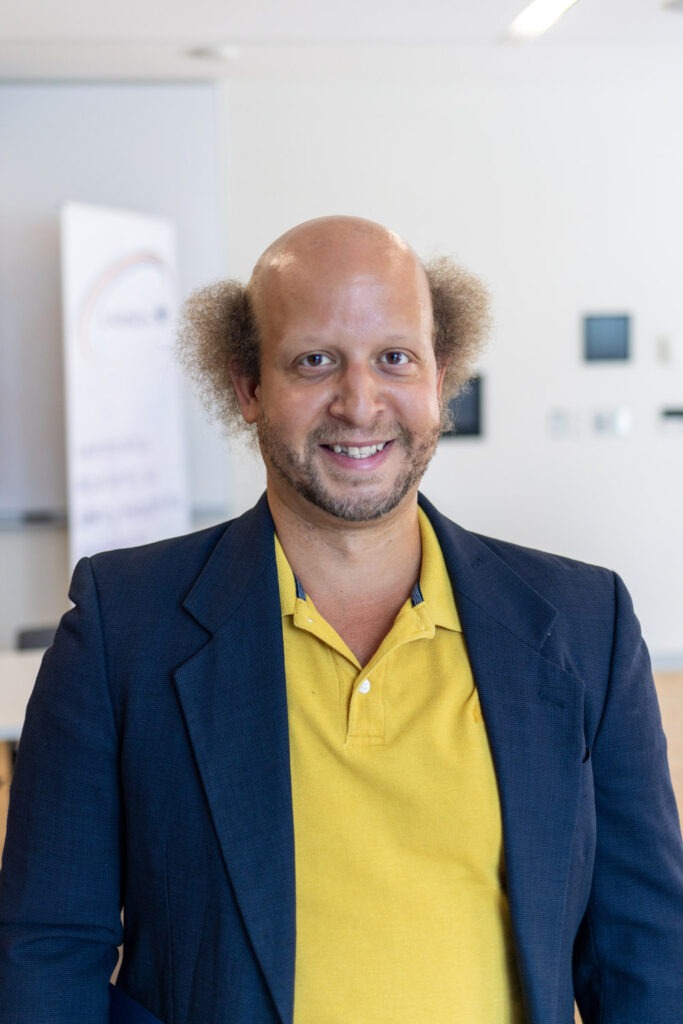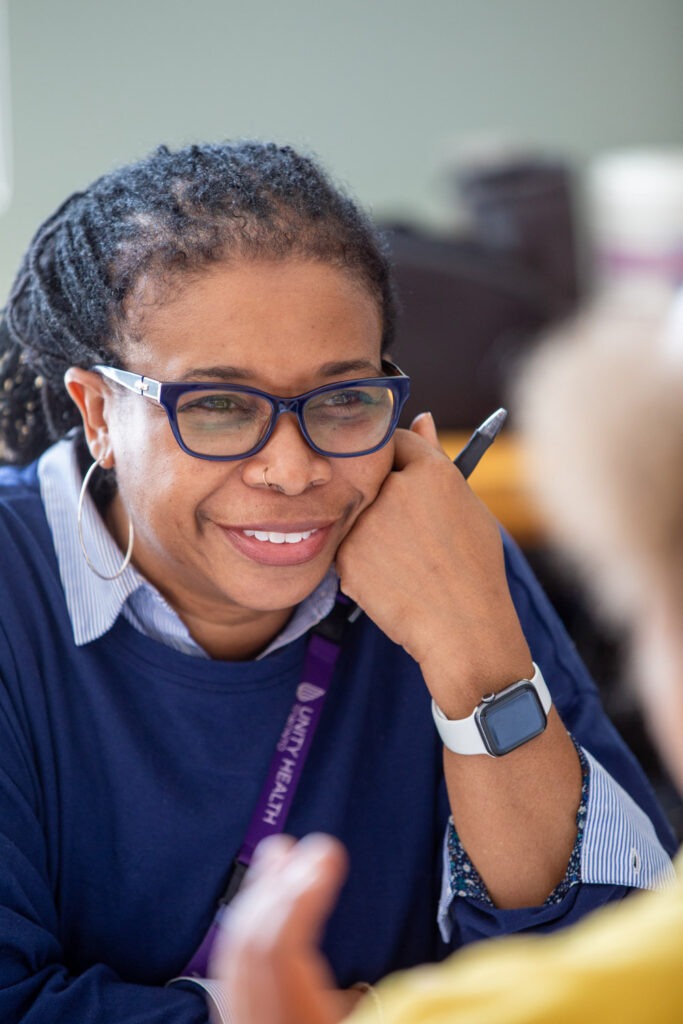How equity-based mentorship is benefitting Unity Health staff

Llijah Pearce, Faye Roberts (sitting) and Sharona Bookbinder.
A special celebration happened at Unity Health Toronto this month: 22 staff completed the first-ever equity-based mentorship program, wrapping up a five-month journey for aspiring leaders to promote equitable leadership and career advancement.
The Leadership and Organizational Development team created the program to prioritize the recruitment and selection of mentors and mentees who self-identify as belonging to communities who have historically experienced and continue to experience barriers in leadership, including Black, Indigenous and racialized people, 2SLGBTQIA+ and people with disabilities. Their mentors included vice-presidents, directors and managers across the network.
“It’s important to invest in our staff and put their needs at the forefront,” says Sharona Bookbinder, a Leadership & Organizational Development Consultant who organized the program. “People don’t usually want to stay stagnant and we’re an organization that values growth and finding meaning in work. Mentorship provides relationships that are supportive and help people find that meaning.”
Sign up for the Unity Health Toronto newsletter, a monthly update on the latest news, stories, patient voices and research emailed directly to subscribers. If you haven’t subscribed yet, you can do that by clicking here.
The feedback to the pilot program has been positive. All mentor and mentee pairs will be continuing their mentorship informally to build and learn from relationships they created. Now an annual offering for staff at Unity Health, applications for the next cohort are due in early 2025.
We caught up with one mentor and mentee duo to learn more about their experiences. Llijah Pearce is a Registered Nurse in the Mental Health and Addictions Program at St. Michael’s, and his mentor, Faye Roberts, is the Manager of Volunteer Services at Unity Health.
Why did you both decide to take part in this mentorship program?

LP: I saw it as a great opportunity to establish myself as someone who’s interested in working towards a leadership position. This stream spoke to me in particular, because I think diversity at Unity Health is so important.Having leaders that represent the community at large, and people that others can look up to and see themselves in is super important to the organization.
FR: I was very fortunate to be part of the very early conversations around the creation of the Affinity group for the Council for Anti-Racism, Equity and Social Accountability (CARESA) at Unity Health and what it could look like, what the goals were, what direction we should be going in. Out of that came this opportunity for a mentorship experience. I was interested because it is an extension of all our hopes and dreams, and being able to connect with people who look, walk and talk like us, who had dreamed about taking the organization on a really important mission to ensure our values came to life. I also saw it as a way to bridge the three sites.
There is a real focus on reflecting on social location as part of the of the mentorship program – why do you think that that is an important part of this initiative?
LP: As someone who is white passing and identifies as Black with Indigenous roots, the equity piece is so valuable. I don’t know if everyone at Unity Health understands the frame of reference from which people come, and how to support folks outside of their norm, in a sense. Feeling safe, feeling confident and even understanding different cultural variables that come to play when people are at work is important. Looking at mentorship through an equity lens, it might offer me a more informed opportunity to move forward and be myself, share some of my experience, and my culture and have it accepted and celebrated.
FR: We talk about equity all the time, but I think you’re absolutely right. It’s not always understood from our perspective, as we walk through the world very differently, and are treated very differently. We can say that out loud to one another. Llijah has such incredible skills. Everything he does he does from a very authentic place. And I don’t think we say that enough about one another, because sometimes it is not always acknowledged. At the end of the day, this means access. A nod, a smile, a pat on the back – that acknowledgement allows for access.
LP: Faye, I love that you use the word access. It’s such a primary word in all of this. It’s about how people who don’t fit the mold [of what we’ve seen in leadership historically] access these circumstances, and that’s what this mentorship has done.
What would you say you’ve gained from this experience?
FR: I am so grateful that I can reach out to Llijah, not just as a colleague but also as a friend. I’ve had volunteers and students who are interested in mental health, and Llijah has been so gracious to open himself up to having conversations with people. So you’ve got this knowledge transfer. It’s sort of passing the torch. He can call me a mentor, but I’ll say that he’s mentored me as well.
LP: The friendship and having an ally is so important to feeling safe in a world that I don’t know a lot about in terms of high-end healthcare leadership. It’s a lot of big players, and Faye has given me the confidence to go into a room and feel safe and secure delivering my message, sharing my history and my perspective authentically.
This mentorship feels like a very different relationship than other collegial or reporting relationships. How and why is it different?
FR: Going back to the authentic piece, with title comes an expectation of how you’re supposed to show up. And that that isn’t a thing, I think, for both Llijah and myself. It’s also the way I’d like to move through the organization. If we are here in service of others, our work shouldn’t be tiered. If we’re here with the understanding of the concept of service, and there are people in great need that come to our doors, who are fragile and really need support, you’ve got to tear down walls. You’ve got to get rid of tiers and roll up your sleeves and get in there to support those who need help.
Why do you both think that it’s valuable for a workplace to be able to provide equity-based mentorship to leaders and aspiring leaders?

LP: I think a lot of people need direction and don’t know how to get to the next place, or even what the next place is. This is a great step towards allowing people to maybe take a closer look, while the leaders, such as Faye, are sharing their experiences. What it means to be a leader, what it looks like, the practicalities of being employed at those levels, so that people can actually make an informed decision. I think it’s so important to break down those walls, break down those barriers and allow people to dream a little bit bigger, because they can see what’s next and what they can strive towards.
FR: I really appreciate that you use the word dream, because I think we get so caught up in our day-to-day that we forget about what we really want. But to your point, I think it’s how we get there is where it becomes blurry. I consider opportunities like this really is networking at its very best. It’s making those connections, having those checkpoints, ensuring that we are still on the same track, that we still have the same values that we’re all creating the same culture.
Is there anything that you’d like to add that we didn’t talk about?
FR: Llijah, whether or not you want to believe it, you’ve helped me build my own confidence. One of the things I asked myself in early days is what could I possibly have to share with you. The trust that we developed with one another over the course of the last couple of months really has helped me become more laser-focused and more intentional in how I move forward. So I wanted to thank you for that.
LP: This experience has definitely allowed me to grow as a professional and as a person. Faye, you ask such focused and sincere questions that really open up my thought to really look at circumstances quite differently, and really acknowledge all the nuances that go into everything that we’re doing, and every sort of clinical outcome that I see and engage with. I would love to see more mentorship opportunities for different folks at the hospital and opening up this program to a wider range to encourage more people to take these opportunities.
This interview has been edited and condensed.
By: Ana Gajic
